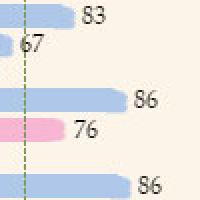Why the New Generation of Databases Needs Fast Analytics - and Why It Matters to Non-Techies
My colleague Jock Mackinlay at Tableau Software recently wrote a short paper, or a Tableau Letter (as we like to call them), about the need for faster analytical tools to enable the next stage of database development. It's called "Fast Analytics: The Next Step for the Database Success Story". He recaps the history of databases and how far we've come. He makes several key points about using data to think that resonated with me, a non-technical person.
My colleague Jock Mackinlay at Tableau Software recently wrote a short paper, or a Tableau Letter (as we like to call them), about the need for faster analytical tools to enable the next stage of database development. It's called "Fast Analytics: The Next Step for the Database Success Story". He recaps the history of databases and how far we've come. He makes several key points about using data to think that resonated with me, a non-technical person.
1) People need databases and analytical tools that operate at the speed of thought. Jock points out that people can only think effectively when the data matches the agility of their thoughts. I am a marketing analyst at heart and all I really care about is getting access to and using my data as fast as possible. I know my data can answer my marketing questions and I don't want to ask someone else to report on it, summarize it, or spend weeks deploying yet another middleware format with its own quirks.
2) People need easier ways to work their data. A former colleague would tell his team who would bring complex reports or reams of data, "don't make me think." I always liked that message - he was saying keep it simple and clear. But what he really meant was "don't make it hard for me to think." We all need more thinking time and less time wasted on writing specs (much less queries), translating tables or reformatting reports. Jock points out that well-designed graphical presentations of data exploit the power of the human visual system and make it easier to see and understand data.
3) Big databases (usually with many terabytes and sometimes called data warehouse appliances) are not just for specialists - ordinary business users (like me) don't want fewer data - we want more. And guess what? We want fast, direct access. The bottleneck will be figuring out how to empower ordinary people to use their data to think better and thus make life better.
Anyway, check out Jock's Letter. It's instructive and thought-provoking in many ways.



